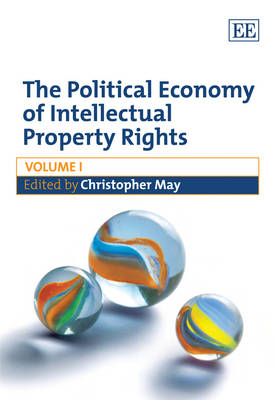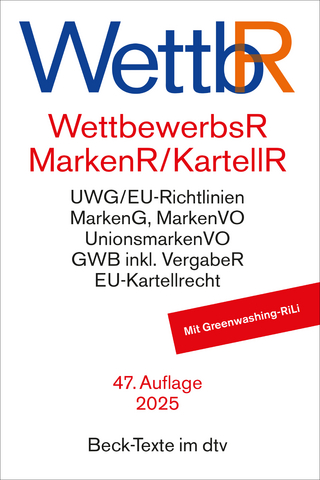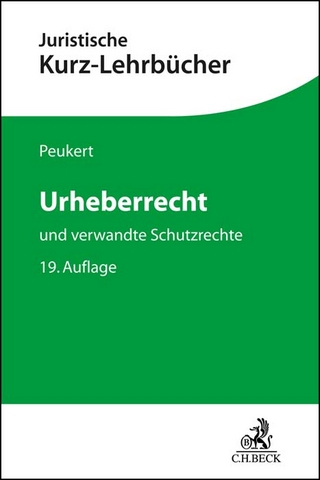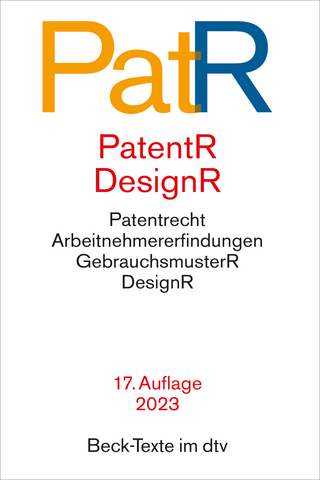
The Political Economy of Intellectual Property Rights
Edward Elgar Publishing Ltd (Verlag)
978-1-84844-074-6 (ISBN)
Christopher May - a leading authority in the field - has selected material that provides important insights on the global governance of intellectual property. His collection ranges across a number of disciplines and political perspectives to establish that the political economic analysis of intellectual property is both multifaceted and contested. Professor May has also provided an introduction that will serve as an authoritative and comprehensive guide to the main issues under discussion. This three-volume set will be an invaluable reference source both for those seeking an in-depth understanding of the main issues in this important field and for established scholars wishing to develop their analysis in new directions.
Edited by Christopher May, Emeritus Professor of Political Economy, Department of Politics, Philosophy and Religion, Lancaster University, UK
Contents:
Volume I
Acknowledgements
Introduction Political Economy and Intellectual Property Rights Christopher May
PART IINTELLECTUAL PROPERTY: NARRATIVES, JUSTIFICATIONS, PROBLEMS
1. D.B. Resnik (2003), ‘A Pluralistic Account of Intellectual Property’
2. Edwin C. Hettinger (1989), ‘Justifying Intellectual Property’
3. Justin Hughes (1988-89), ‘The Philosophy of Intellectual Property’
4. Mark A. Lemley (2004), ‘Ex Ante versus Ex Post Justifications for Intellectual Property’
5. Akalemwa Ngenda (2005), ‘The Nature of the International Intellectual Property System: Universal Norms and Values or Western Chauvinism?’
6. Sharmishta Barwa and Shirin M. Rai (2002), ‘The Political Economy of Intellectual Property Rights: A Gender Perspective’
7. Liam Séamus O'Melinn (2007), ‘Software and Shovels: How the Intellectual Property Revolution is Undermining Traditional Concepts of Property’
PART IIHISTORIES OF INTELLECTUAL PROPERTY
8. Christopher May (2007), ‘The Hypocrisy of Forgetfulness: The Contemporary Significance of Early Innovations in Intellectual Property’
9. Susan Sell (2004), ‘Intellectual Property and Public Policy in Historical Perspective: Contestation and Settlement’
10. Peter K. Yu (2006), ‘Of Monks, Medieval Scribes and Middlemen’
11. Robert P. Merges (2000), ‘One Hundred Years of Solicitude: Intellectual Property Law 1900–2000’
12. Graham Dutfield and Uma Suthersanen (2005), ‘Harmonisation or Differentiation in Intellectual Property Protection? The Lessons of History’
PART IIIENCLOSURE AND THE INFORMATION COMMONS
13. Harlan J. Onsrud (1998), ‘Tragedy of the Information Commons’
14. James Boyle (2003), ‘The Second Enclosure Movement and the Construction of the Public Domain’
15. Michael A. Heller and Rebecca S. Eisenberg (1998), ‘Can Patents Deter Innovation? The Anticommons in Biomedical Research’
16. Daniel J. Kevles (1998), ‘Diamond v. Chakrabarty and Beyond: The Political Economy of Patenting Life’
17. C. Ford Runge and Edi DeFrancesco (2006), ‘Exclusion, Inclusion, and Enclosure: Historical Commons and Modern Intellectual Property’
18. Anthony McCann (2005), ‘Enclosure Without and Within the “Information Commons”’
PART IVINTELLECTUAL PROPERTY AND ECONOMICS
19. Antoon A. Quaedvlieg (1992), ‘The Economic Analysis of Intellectual Property Law’
20. James Boyle (2000), ‘Cruel, Mean, or Lavish? Economic Analysis, Price Discrimination and Digital Intellectual Property’
21. Keith E. Maskus and Mohan Penubarti (1995), ‘How Trade-Related are Intellectual Property Rights?’
22. Edmund W. Kitch (2000), ‘Elementary and Persistent Errors in the Economic Analysis of Intellectual Property’
Volume II
Acknowledgements
An introduction by the editor to all three volumes appears in Volume I
PART ITHE WORLD TRADE ORGANISATION AND THE TRIPS AGREEMENT
1. Peter Drahos (1995), ‘Global Property Rights in Information: The Story of TRIPS at the GATT’
2. Graeme B. Dinwoodie and Rochelle C. Dreyfuss (2004), ‘TRIPS and the Dynamics of Intellectual Property Lawmaking’
3. Laurence R. Helfer (2004), ‘Regime Shifting: The TRIPs Agreement and New Dynamics of International Intellectual Property Lawmaking’
4. Rajan Dhanjee and Laurence Boisson de Chazournes (1993), ‘Trade Related Aspects of Intellectual Property Rights (TRIPS): Objectives, Approaches and Basic Principles of the GATT and of Intellectual Property Conventions’
5. Keith E. Maskus (2002), ‘Regulatory Standards in the WTO: Comparing Intellectual Property Rights with Competiton Policy, Environmental Protection, and Core Labor Standards’
6. Daya Shanker (2003), ‘Legitimacy and the TRIPS Agreement’
7. Ruth L. Okediji (2003), ‘Public Welfare and the Role of the WTO: Reconsidering the TRIPs Agreement’
8. A. Samuel Oddi (1996), ‘TRIPS – Natural Rights and a “Polite Form of Economic Imperialism”’
PART IITRIPS, AIDS AND ACCESS TO AFFORDABLE MEDICINES
9. Anna Lanoszka (2003), ‘The Global Politics of Intellectual Property Rights and Pharmaceutical Drug Policies in Developing Countries’
10. Robert L. Ostergard, Jr. (1999), ‘The Political Economy of the South Africa-United States Patent Dispute’
11. Frederick M. Abbott (2002), ‘The TRIPS Agreement, Access to Medicines, and the WTO Doha Ministerial Conference’
12. David Vaver and Shamnad Basheer (2006), ‘Popping Patented Pills: Europe and a Decade's Dose of TRIPs’
13. Duncan Matthews (2005), ‘TRIPs Flexibilities and Access to Medicines in Developing Countries: The Problem with Technical Assistance and Free Trade Agreements’
14. Kenneth C. Shadlen (2007), ‘The Political Economy of AIDS Treatment: Intellectual Property and the Transformation of Generic Supply’
PART IIIPECULIARITIES OF COPYRIGHT
15. Brendan Scott (2001), ‘Copyright in a Frictionless World: Towards a Rhetoric of Responsibility’
16. Timothy J. Brennan (1993), ‘Copyright, Property, and the Right to Deny’
17. Wendy J. Gordon (2004), ‘Do We Have a Right to Speak with Another's Language? Eldred and the Duration of Copyright’
18. Joseph P. Liu (2003), ‘Copyright Law's Theory of the Consumer’
19. Jessica Litman (1991), ‘Copyright as Myth’
Volume III
Acknowledgements
An introduction by the editor to all three volumes appears in Volume I
PART ITECHNOLOGY AND INTELLECTUAL PROPERTY
1. Kenneth C. Shadlen, Andrew Schrank and Marcus J. Kurtz (2005), ‘The Political Economy of Intellectual Property Protection: The Case of Software’
2. Nicola Lucchi (2005), ‘Intellectual Property Rights in Digital Media: A Comparative Analysis of Legal Protection, Technological Measures and New Business Models Under EU and US Law’
3. Robert Hunter Wade (2002), ‘Bridging the Digital Divide: New Route to Development or New Form of Dependency?’
4. Paul A. David (1993), ‘Knowledge, Property and the System Dynamics of Technological Change’
5. Simon Avenell and Herb Thompson (1994), ‘Commodity Relations and the Forces of Production: The Theft and Defence of Intellectual Property’
PART IITHE RIGHT TO DEVELOP? DEVELOPING COUNTRIES VS. INTELLECTUAL PROPERTY
6. Nagesh Kumar (2003), ‘Intellectual Property Rights, Technology and Economic Development: Experiences of Asian Countries’
7. Peter Drahos (1997), ‘Thinking Strategically About Intellectual Property Rights’
8. Ruth L. Gana (1996), ‘The Myth of Development, The Progress of Rights: Human Rights to Intellectual Property and Development’
9. Hans Morten Haugen (2007), ‘Patent Rights and Human Rights: Exploring their Relationships’
10. Paul Steidlmeier (1993), ‘The Moral Legitimacy of Intellectual Property Claims: American Business and Developing Country Perspectives’
11. Andréa Koury Menescal (2005), ‘Changing WIPO's Ways? The 2004 Development Agenda in Historical Perspective’
PART IIINORMATIVE (RE)PRODUCTION: SOCIALISATION, LOBBYING AND TECHNICAL ASSISTANCE
12. Kurt Burch (1995), ‘Intellectual Property Rights and the Culture of Global Liberalism’
13. Susan K. Sell (1995), ‘The Origins of a Trade-Based Approach to Intellectual Property Protection: The Role of Industry Associations’
14. Peter Drahos and John Braithwaite (2002), ‘Intellectual Property, Corporate Strategy, Globalisation: TRIPS in Context’
15. Paul Steidlmeier and Cecilia Falbe (1994), ‘International Disputes Over Intellectual Property’
16. Christopher May (2004), ‘Capacity Building and the (Re)Production of Intellectual Property Rights’
17. Duncan Matthews and Viviana Munoz-Tellez (2006), ‘Bilateral Technical Assistance and TRIPS: The United States, Japan and the European Communities in Comparative Perspective’
18. Debora J. Halbert (2007), ‘The World Intellectual Property Organization: Past, Present and Future’
PART IVINTELLECTUAL PROPERTY: CRITIQUE OR ABOLITION?
19. James Boyle (1997), ‘A Politics of Intellectual Property: Environmentalism for the Net?’
20. John Frow (1996), ‘Information as Gift and Commodity’
21. Sol Picciotto and David Campbell (2004), ‘Whose Molecule is it Anyway? Private and Social Perspectives on Intellectual Property’
22. Brian Martin (1995), ‘Against Intellectual Property’
23. Graham Dutfield (2007), ‘A Rights-free World – Is it Workable, and What is the Point?’
Index
| Erscheint lt. Verlag | 30.11.2010 |
|---|---|
| Reihe/Serie | Elgar Mini Series |
| Verlagsort | Cheltenham |
| Sprache | englisch |
| Maße | 169 x 244 mm |
| Themenwelt | Recht / Steuern ► EU / Internationales Recht |
| Recht / Steuern ► Wirtschaftsrecht ► Urheberrecht | |
| Wirtschaft ► Volkswirtschaftslehre ► Wirtschaftspolitik | |
| ISBN-10 | 1-84844-074-X / 184844074X |
| ISBN-13 | 978-1-84844-074-6 / 9781848440746 |
| Zustand | Neuware |
| Haben Sie eine Frage zum Produkt? |
aus dem Bereich


